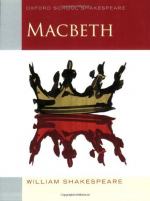|
This section contains 12,517 words (approx. 42 pages at 300 words per page) |

|
SOURCE: Sadowski, Piotr. “The Masculine in Macbeth.” In Gender and Literature: A Systems Study, pp. 297-325. Lanham, Md.: University Press of America, 2001.
In the following excerpt, Sadowski asserts that the “masculine principle” is a crucial agent in Macbeth's progression from “statism,” wherein he is concerned with honor and conscience, to a state of “endodynamism,” wherein he becomes preoccupied with remorseless ambition and the consolidation of power.
According to the working definition adopted in the previous chapter, tragedy as a literary mode describes events leading towards an irreversible disturbance of the protagonist's functional equilibrium, often realized in death, or at least to a permanent maladaptation in the form of his or her total alienation from social relations. The critic Bernard McElroy calls this maladaptation “the complete disorientation of the individual from his most basic assumptions about himself and the world around him.”1 Literary plots of this type are most...
|
This section contains 12,517 words (approx. 42 pages at 300 words per page) |

|


